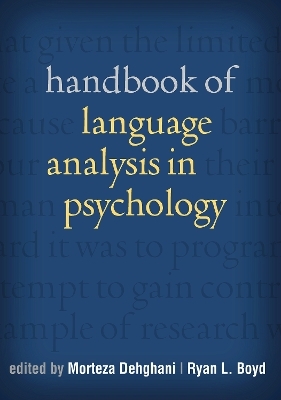
Handbook of Language Analysis in Psychology
Guilford Press (Verlag)
978-1-4625-4843-9 (ISBN)
Morteza Dehghani, PhD, is Associate Professor of Psychology and Computer Science and a member of the faculty of the Brain and Creativity Institute at the University of Southern California. Dr. Dehghani's research relies on machine learning and natural language processing to explore cognitive and psychological traces in artifacts of social discourse. Specifically, he investigates properties of moral cognition by analyzing language in conjunction with behavioral studies. Dr. Dehghani is a recipient of a CAREER Award from the National Science Foundation and a Young Investigator Award from the Air Force Office of Scientific Research. Ryan L. Boyd, PhD, is Assistant Professor of Behavioral Analytics at Lancaster University in the United Kingdom, holding shared appointments in the Department of Psychology, Security Lancaster, and the Data Science Institute. His research interests broadly revolve around how our motives are revealed in language--that is, how our everyday words provide clues to why we think, feel, and behave in the ways that we do. Dr. Boyd’s research spans topics ranging from personality to society, mental health, human sexuality, and storytelling. He has authored dozens of free, open-source text analysis programs for social scientists, and he has been involved in the development of Linguistic Inquiry and Word Count since 2015. Dr. Boyd is on the editorial boards at PLOS ONE and Frontiers in Artificial Intelligence: Language and Computation, and is a member of the advisory board for Psychology of Language and Communication.
I. Introduction and Methods
1. Text Analysis for Psychology: Methods, Principles, and Practices, Brendan Kennedy, Ashwini Ashokkumar, Ryan L. Boyd, & Morteza Dehghani
II. Dyadic Synchrony/Psychological Coordination in Conversations
2. Language Coordination in Writing and Conversation, Molly E. Ireland & Taleen Nalabandian
3. Language in Close Relationships, Andrea B. Horn & Tabea Meier
4. Harnessing a Language Analysis Perspective to Uncover Emergent Group Processes, Aimée A. Kane & Lyn M. van Swol
5. Cooperation, Interaction, Search: Computational Approaches to the Psychology of Asking and Answering Questions, Christina M. Boyce-Jacino & Simon DeDeo
III. Political Psychology
6. Language Analysis in Political Psychology, Kayla N. Jordan
7. Automated Integrative Complexity: Language Analysis Tools for Psychological Research, Shannon C. Houck, Lucian Gideon Conway, III, & Alivia Zubrod
8. Text as Data in Political Psychology, Martijn Schoonvelde, Christian Pipal, & Gijs Schumacher
IV. Morality
9. Language Analysis in Moral Psychology, Mohammad Atari & Morteza Dehghani
10. Morality in Politics, Sze Yuh Nina Wang & Yoel Inbar
11. Morality in Language, Cristina Leone & Laura Niemi
V. Deception/Lying
12. Motivation for Deception, Paul J. Taylor, Grace McKenzie, & Ben Marshall
13. Lies and Language: A Context-Contingent Approach to Verbal Cues of Deceit, David M. Markowitz & Jeffrey T. Hancock
14. Deception and Its Detection, Judee K. Burgoon, Norah E. Dunbar, & Lee A. Spitzley
VI. Personality and Individual Differences
15. Investigating Individual Differences in Metaphor Use and Its Outcomes: Research Questions, Measurement, and Findings, Adam K. Fetterman, Katherine French, & Brian P. Meier
16. The Quantum Self: Examining Methodologies to Understand How Language Impacts Bilinguals’ Dual Selves, Shu Jiang & Nairán Ramírez-Esparza
17. Personality Disorder and Verbal Behavior, Charlotte Entwistle, Ely Marceau, & Ryan L. Boyd
VII. Affect/Sentiment
18. Behavioral Machine Intelligence with Language, Nikolaos Malandrakis, Victor Martinez, Anil Ramakrishna, Manoj Kumar, Karan Singla, Md Nasir, & Shrikanth Narayanan
19. Theory-Driven Measurement of Emotion (Expressions) in Social Media Text, William J. Brady, Killian McLoughlin, & M. J. Crockett
20. Identifying and Understanding the Targets of Sentiment Analysis, Charles Welch, Mahmoud Azab, & Rada Mihalcea
VIII. Public Health and Well-Being
21. The Language of Environmentalism: Harnessing Social Media Data in the Face of Environmental Uncertainty, Sonya Sachdeva
22. The Language of Mindfulness: Studying Contemplative Experience through Natural Language, Angelina J. Polsinelli, Deanna M. Kaplan, & Matthias R. Mehl
IX. Judgment/Biases
23. Knowledge, Cognition, and Everyday Judgment: An Introduction to the Distributed Semantics Approach, Russell Richie & Sudeep Bhatia
24. Sociolinguistic Properties of Word Embeddings, Alina Arseniev-Koehler & Jacob G. Foster
25. Social Biases in Word Embeddings and Their Relation to Human Cognition, Aylin Caliskan & Molly Lewis
26. Word Embeddings Reveal Social Group Attitudes and Stereotypes in Large Language Corpora, Tessa E. S. Charlesworth & Mahzarin R. Banaji
X. Ethical Guidelines
27. Ethical Pitfalls for Natural Language Processing in Psychology, Mark Alfano, Emily Sullivan, & Amir Ebrahimi Fard
28. Ethical Issues in Text Mining for Mental Health, Joshua August Skorburg & Phoebe Friesen
XI. Looking to the Horizon
29. Intergrouping and Aging Matters Textually, Howard Giles & Joseph B. Walther
30. Text and Discourse with Humans and Computers, Arthur C. Graesser & Leah C. Windsor
31. Computer-Based Language Analysis as a Paradigm Shift, James W. Pennebaker
Author Index
Subject Index
| Erscheinungsdatum | 06.03.2022 |
|---|---|
| Verlagsort | New York |
| Sprache | englisch |
| Maße | 178 x 254 mm |
| Gewicht | 1220 g |
| Themenwelt | Geisteswissenschaften ► Psychologie ► Allgemeine Psychologie |
| Geisteswissenschaften ► Psychologie ► Sozialpsychologie | |
| ISBN-10 | 1-4625-4843-1 / 1462548431 |
| ISBN-13 | 978-1-4625-4843-9 / 9781462548439 |
| Zustand | Neuware |
| Haben Sie eine Frage zum Produkt? |
aus dem Bereich


